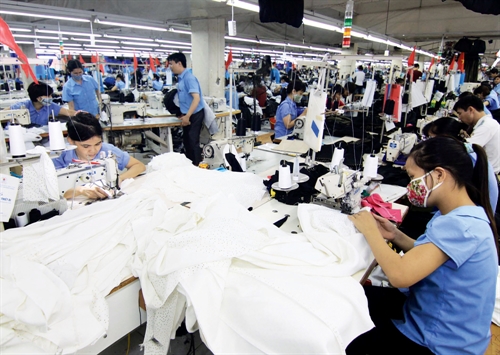Businesses would likely narrow the pay gap among employees and recalculate wage scale based on productivity at work instead of seniority.
This is among the breakthrough amendments to Government Decree 49 of 2013 recently proposed by the Ministry of Labor, Invalids and Social Affairs (MOLISA).
According to the ministry, the current pay gap of at least five percent between wage levels has affected wage policy, structure of wage scales and payroll of enterprises, and is unsuitable with market mechanisms.
 |
| An export garment production line in Hung Yen Garment Company (Hung Yen province)__Photo:VNA |
Specifically, as the current wage regulations require businesses to build their wage scales based on seniority, consequently, businesses had to pay high wages and high social insurance premiums, usually two or three times higher, for senior employees who performed the same jobs as junior ones. As a result, many businesses sought to fire senior workers so as they could recruit new ones.
Under the draft amendments, the ministry has proposed two options to replace the current regulations.
In the first option, the regulation on five-percent pay gap at every wage level would be abolished. Enterprises and their trade unions would discuss to determine payments for employees based on their performance and job titles.
As per the second option, the pay gap would be defined and reduced from five percent to three percent.
According to experts, the first option would increase autonomy for enterprises but pose a risk to employees’ benefits. Meanwhile, under the second option, employees’ benefits would be better guaranteed but enterprises might be restricted in building their wage scales and payroll. The MOLISA, for its part, recommended the second option.
Bui Sy Loi, Vice Chairman of the National Assembly’s Committee on Social Affairs, backed the draft decree, saying to Nong thon ngay nay (Countryside Today) newspaper that wages had been considered barriers to the development of each employee and enterprise.
“Those with good performance were paid the same as others because of seniority-based wage calculation,” he said.
Pham Minh Huan, former Deputy Minister of Labor, War Invalids and Social Affairs, agreed with Loi, saying that in fact many companies were facing financial burden under current regulations. “Basic wages have been increasing, so the payment would be higher year by year while the labor productivity will not improve much,” Huan explained.
Nguyen Xuan Duong, Chairman of Hung Yen province’s Businesses Association and President of Hung Yen Garment Corporation, said regulations on reducing the pay gap to below five percent or even eliminating it would create conditions for enterprises to self-regulate the de sign of wage scale. “This means that enterprises would use wage funds to increase wages for hard-working employees with high productivity instead of raising wages for all employees,” Duong was quoted by the Vietnam News daily as saying.
However, there remains some opposite opinions.
Vu Quang Tho, Director of the Institute for Workers and Trade Unions, worried that the regulations would likely make employees’ lives more difficult.
“The wage of workers was too low. Each time the pay rises, their wage could increase only a few dong, even not enough for them to buy a pack of candy. With the new pay gap of three percent, employees’ lives would be very hard,” he said.-(VLLF)









